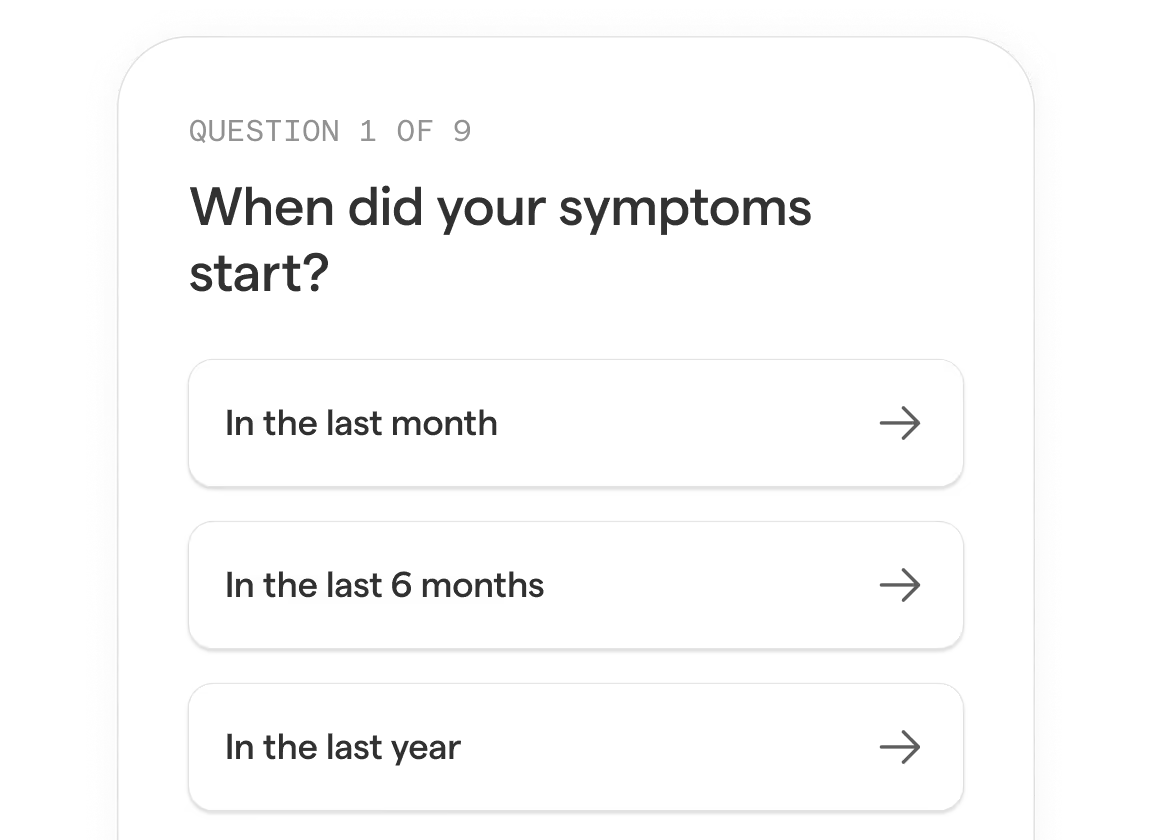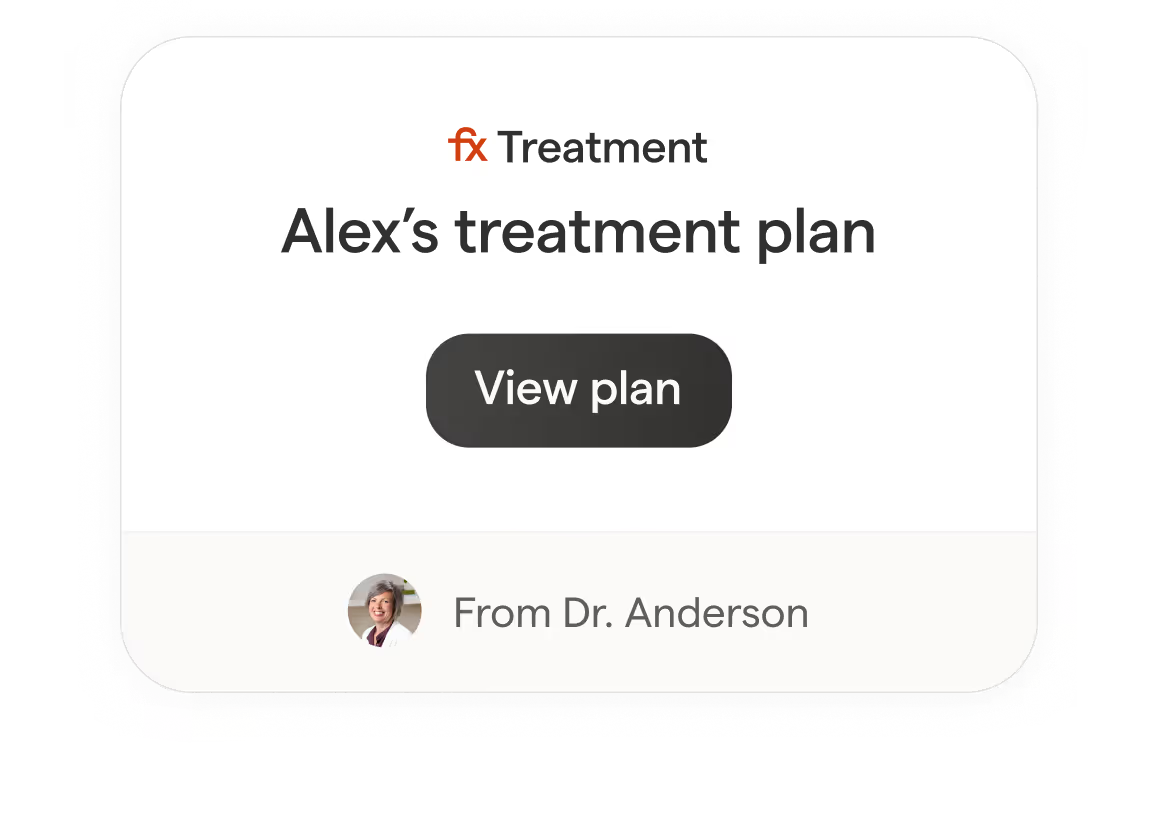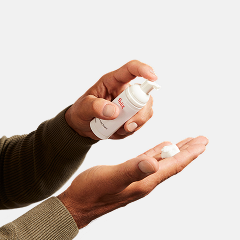Download the Felix App
Earn reward, visit our shop and get exclusive offers on the app
Download now

With Felix, you can get Famotidine prescribed by a licensed healthcare practitioner and delivered to your door for free.
Famotidine is a medication belonging to the competitive inhibitor of histamine H2-receptors family of drugs.
It’s indicated for use in a number of different scenarios, where reduction of gastric juice secretion could be a valuable part of a patient’s treatment plan.
The brand name for Famotidine is Pepcid, but you can also find it under the generic name Famotidine or Mylan-Famotidine. Regardless of its name, Famotidine and Mylan-Famotidine will include the same active ingredients.
If you’d like to learn more about uses for Famotidine, or how Famotidine is beneficial for GERD and acid reflux symptoms, you can click here for more information.
For those wondering, “how does Famotidine work?”, Famotidine dosages work by reducing the amount of acids that are produced by your stomach.
When you’re experiencing a condition that is being caused or worsened by excess stomach acid, Famotidine prescriptions may be suggested to help control these acid levels, as well as reduce symptoms.
Most of the side effects of Famotidine that are reported are mild, and in many cases, they may lessen or disappear as your body adjusts to your Famotidine medication.
With that in mind, when side effects of Famotidine do occur, the most frequently experienced include:
If any of these potential side effects of Famotidine begin to negatively impact your daily quality of life, you should contact your practitioner to see if they can suggest alternatives to Famotidine without interactions, or adjust your dosage of Famotidine to reduce side effects from occurring.
In addition, there are some less commonly occurring side effects of Famotidine to be mindful of, such as:
Your practitioner may want to re-evaluate your dosage of Famotidine if you’re experiencing these side effects, or suggest an alternative treatment option to your Famotidine prescription that may work better for you.
There are a number of people who shouldn’t use Famotidine prescriptions, including:
Let your practitioner know if any of these conditions apply to you, as they may want to suggest an alternative to Famotidine without interactions.
If you’re curious about what Famotidine is used for, there are a few different conditions that dosages of Famotidine may be prescribed to treat, depending on the recommendations from your licensed healthcare practitioner.
Some of these uses for Famotidine include:
As with any medication, Famotidine has other drugs that may interact with it negatively, which is why it’s vital that you let your practitioner know about any/all of the treatments that you’re currently using.
This will help them ensure that your Famotidine prescription won’t cause negative interactions with your other medications.
In addition, as it’s not recommended for use in pregnancy, you shouldn’t use Famotidine if you’re pregnant or planning to become pregnant. The same concerns apply to Famotidine medications passing through breast milk to a nursing child, so you should avoid using Famotidine while breastfeeding or planning to breastfeed.
Drinking alcohol, especially more than 3 drinks in a day, isn’t recommended while taking Famotidine. One of the most common side effects of Famotidine is dizziness, which may be worsened by alcohol intake.
Also, alcohol intake can increase stomach acidity, which is counter-productive to the purpose of using a Famotidine prescription.
Both acid reflux and GERD symptoms are caused by excess stomach acid, which is why Famotidine is used to treat these two conditions.
Famotidine medications reduce the production of stomach acids, which can help reduce the severity and frequency of symptomatic flare-ups for those at high risk for acid reflux or diagnosed with GERD.
While you may be able to take other medications with your Famotidine, it’s vital that you let your practitioner know about any other treatments that you may be using, so that they can avoid potential interactions with your Famotidine prescription.
Additionally, there are some other medications that are known to cause negative interactions with Famotidine prescriptions, including:
If you’re already using one of these pharmaceutical treatments, your practitioner will likely suggest alternatives to Famotidine without interactions that could cause harmful side effects.
Further reading








Below a certain dose, Famotidine does not require a prescription to access. For example, Pepcid, a Famotidine medication, is available over-the-counter. Above a certain dose, a prescription will be needed to access Famotidine.
Luckily, Felix is making this process as quick, accessible, and seamless as possible for patients across the country through our secure, chat-based online assessment system.
Once you’ve completed your assessment (it only takes a few minutes), one of our licensed healthcare practitioners can determine whether they think using Famotidine medications could be a beneficial part of your treatment plan.
If they do, they can not only provide you with a prescription for Famotidine, but Felix’s pharmacy partners can deliver your Famotidine (and refills) at no cost to you!
This question would be better asked to your insurance representative directly when it comes to private insurance, because every benefits package and insurance provider will offer a different set of features and options.
We’re happy to say that if you do have any coverage to get Famotidine online in Canada, Felix can bill your insurer directly to save you both the time and the trouble of managing the paperwork yourself.
The same issue arises when considering provincial health plan coverage, because what’s available in one province may not be available in others, or the eligibility criteria may be different.
We’d suggest checking your provincial health plan drug formulary to see whether online Famotidine orders are covered in your province, and what eligibility criteria needs to be met in order to apply for these benefits.
The first thing that you need to do, if you’re looking to request an online Famotidine prescription in Canada from Felix is to complete your online assessment.
This can be done anytime that makes sense for your schedule, day or night, and it only takes a few minutes to complete. Typically, one of our licensed healthcare practitioners will get back to your request within 24 hours of its submission.
If they believe that an online Famotidine prescription could be a beneficial part of your treatment plan, they’ll be able to provide you with a prescription for it. Felix’s pharmacy partners can even fill and ship your Famotidine medication directly (and discreetly) to your doorstep - at no extra cost to you.
Best of all, we can arrange for future Famotidine refills to be delivered automatically when you need them, so that you never have to worry about running out of your treatments. It’s just another way Felix is helping you take back control of your health and quality of life, so that you can get back to living life on your terms.
Felix is Canada’s first truly integrated healthcare platform. We provide on-demand treatment for everyday health needs like weight loss, mental health, sexual health, and more. Founded in 2019, our digital-first approach to healthcare includes everything from diagnosis to prescription — all accessible from the comfort of home.
No. Felix provides a faster, hassle-free way for you to get a treatment plan for certain conditions, but our service does not replace your primary care provider. For matters that extend beyond obtaining a lifestyle treatment safely and easily, we encourage you to consult your primary health practitioner in person — whether for checkups, personal health concerns, or to inform them about your current treatments or treatment plans.
Absolutely. Our online assessments have been designed to ask all the necessary questions required for diagnosis. We've worked with specialists to create an assessment process that can provide sufficient information for the healthcare practitioner to determine whether or not you are eligible for a prescription and craft an appropriate treatment plan.
Call 911 or proceed to your nearest emergency room immediately. Felix is not intended for medical emergencies. Once the emergency has been addressed or resolved, contact your prescribing practitioner to inform them of your experience as this may impact your current treatment plan.
Anyone who is 18 years or older (16 or older for acne and birth control prescriptions), and is located in Alberta, British Columbia, Manitoba, Newfoundland and Labrador, Nova Scotia, Prince Edward Island, Saskatchewan or Ontario. We cannot ship treatments outside of these provinces at this time.
After creating an account, you will complete a medical assessment for evaluation by one of the Felix healthcare practitioners.
During your assessment, you will have the opportunity to send your practitioner questions via secure messaging.
In most cases, practitioners will complete your assessment with secure messaging alone but sometimes they may determine you require an audio or video visit and/or further diagnostic testing to help determine the best treatment plan for you.
If your practitioner has determined a prescription treatment is appropriate, they will approve your visit and write you a prescription. Our pharmacy will then ship your prescription to your home.
You’ll be able to message your healthcare practitioner if you have questions or want to make changes to your treatment at any time.
No. We use an asynchronous telemedicine model so you can complete your online visit in your own time and we save your progress so you can come back later to finish it.
If you are completing a visit in the mental health or weight loss categories, your healthcare practitioner may require a phone or video call to discuss your medical profile further during the assessment process.
Most assessments do not require a phone or video conversation. Once a prescriber has reviewed the info in your assessment they will respond to you via secure instant messages that you can access within your Felix account.
If you are completing a visit in the mental health or weight loss categories, your healthcare practitioner may require a phone or video call to discuss your medical profile further during the assessment process.
You can expect to receive a response from a healthcare practitioner within 24 hours of submission. If you’ve been waiting longer than this, please reach out to our Patient Support team through the chat bubble in the bottom right corner of your account or our Contact Us page.
No. A visit with a licensed healthcare practitioner is required for all treatments currently provided through Felix’s service.
Not long. After completing your assessment, a practitioner will generally respond within 24 hours, and often much sooner.
Treatment plans will be processed within 2-4 business days of your approval date if there is nothing blocking fulfillment.
All packages usually takes 2-3 business days. You will receive an email with your tracking number once your treatment has been shipped.
Absolutely. All Felix shipments arrive in a nondescript blister package so you can have your treatment shipped wherever makes sense for you as long as there is someone there to sign for it.
A signature upon delivery may be required.
There is currently no cost to have your treatment shipped to you from our Felix Pharmacy network.
Yes, your security is paramount to Felix’s mission. Personal health information provided during your medical assessment is strictly and legally confidential between you and the Felix healthcare practitioner.
Beyond that, all your account information (including the medical assessment, credit card, and shipping information, etc.) is also stored safely and securely. Felix is compliant with all federal and provincial health privacy legislation. It is our duty to protect your data with comprehensive security infrastructure and stringent data policies to ensure it stays private and secure.
Read more on our Privacy Policy.
Yes! In Canada, only a licensed healthcare practitioner can write a prescription, and only a registered pharmacist can fill that prescription. We are supported by leaders in the Canadian pharmacology and specialized medical fields. Felix adheres strictly to all the regulations set forth by all applicable Colleges of Pharmacists and Colleges of Physicians and Surgeons in which we operate.
Absolutely. All prescriptions obtained via Felix are provided by licensed Canadian healthcare practitioners—the same as you would get at a hospital, doctor’s office, or clinic. These practitioners do not provide prescriptions unless they deem it medically safe and appropriate to write them based on your medical profile and assessment answers. Our assessments have been crafted by the practitioners on our medical team. Finally, all Felix Pharmacies are provincially accredited just like any retail pharmacy.
Your privacy is our top priority. All your data is 256 bit SSL/TLS encrypted, and we take significant steps to keep your data secure. You can read our Privacy Policy for more information.
Felix charges a fee for the online visit. In most cases the fee is $40 but varies by treatment category. The visit fee includes a prescription valid for up to a year (depending on the condition) and on-going support from the healthcare practitioner or pharmacist.
It depends. Treatment costs vary but will be in line with what you would pay at a pharmacy in person. You will see the estimated cost of your treatment before insurance, during the online visit but will only be billed for medication costs for your prescription once it is approved and sent to our pharmacy. Once approved, your treatment and payment will be processed within one to two days.
Keep in mind that you won’t necessarily need to pay the full price yourself. If you have insurance, Felix’s partner pharmacies will bill your insurer directly. You may also be eligible for financial support in your province.
We accept all major credit cards for any aspect of your treatment not covered by insurance or other financial support
Treatment coverage varies greatly between different insurance plans.
The good news is that if you are covered, Felix can bill your insurer directly, and then process your treatment plan at no additional cost to you. We recommend that you upload your private and/or provincial benefit card during the online visit so that our pharmacy partner can apply any coverage you are eligible for before processing your treatment plan.
Insurance coverage for treatment plans through Felix doesn't include the cost of your visit.
A Felix online visit is considered asynchronous since it is conveniently completed through a secure chat bases system. Currently, asynchronous visits are not covered by insurance or provincial health plans so you will be charged a visit fee, depending on the category of treatment you are requesting.
Medication coverage varies greatly between different plans, provinces, and has specific criteria that determine eligibility. For private insurance, we recommend contacting your benefits administrator with your details and the Drug Identification Number (DIN) and the drug name to determine your coverage.
For more details on provincial health plan coverage see below:
Alberta: Learn more about AHCIP here. Search for covered drugs here.
British Columbia: Learn more about MSP here. Search for covered drugs here.
Manitoba: Learn more about MHSIP here. Search for covered drugs here.
Newfoundland and Labrador: Learn more about MCP here. Search for covered drugs here.
Nova Scotia: Learn more about MSI here. Search for covered drugs here.
Ontario: Learn more about OHIP+ here. Search for covered drugs here.
Prince Edward Island: Learn more about Health PEI here. Search for covered drugs here.
Saskatchewan: Learn more about Saskatchewan Health Coverage here. Search for covered drugs here.












